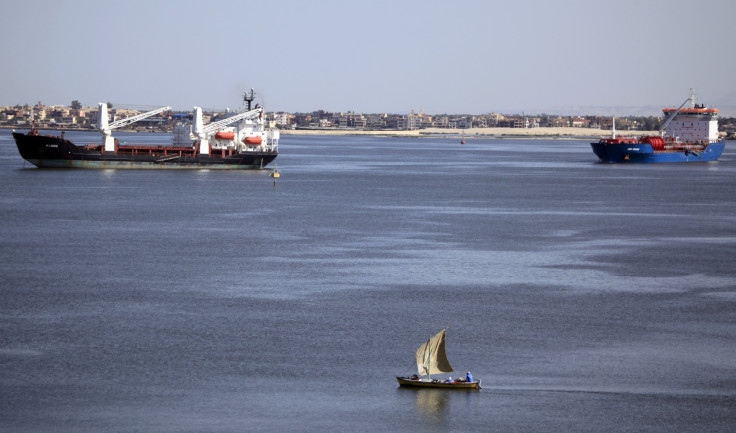Egypt to Dig New $4bn Suez Canal

Egypt is to build a new 45-mile canal alongside the existing Suez Canal at a cost that will run into billions of dollars.
Mohab Mamish, who chairs the Suez Canal Authority, told a news conference that "the total estimated cost of digging for the new channel will be about $4bn [£2.3bn]" as the government looks to a series of Suez-related megaprojects to stimulate the country's listless economy.
Earlier this week, details of an industrial mega-hub project emerged, which would increase the volume of ships along the route and which analysts suggest could boost the canal's annual revenues from $5bn to $13bn.
Reuters reported that the Egyptian Armed Forces Engineering Authority was among the bidders selected to undertake the development projects - emphasising the wide sphere of business influence the army has accrued (some estimate their assets to total 40% of the Egyptian economy).
However, it's a claim that was swiftly denied by the authority's spokesperson Mahmoud Rizk, who said that the military had "no links" with it.
The Suez Canal was opened in 1869 and has since provided the fastest shipping route between Asia and Europe. In the first six months of 2013, it brought $2.44bn into government coffers as more than 8,000 ships carrying 459m tonnes of freight passed through its channel, according to Egypt's Information Portal.
The channel project will involve 35km (22 miles) of dry digging and 67km of "expansion and deepening" of the existing canal, Mamish said.
The political upheaval which has defined the country since the Arab Spring began in 2011 has had a huge impact on tourism - a vital source of income for the Egyptian economy. In 2010, before the Arab Spring, 14.5 million tourists visited Egypt. That figure had fallen to 9.5 million in 2013, as tourists continue to be concerned by reports of violence.
Throughout this time, the Suez Canal has been the most reliable and constant source of jobs and hard currency for the Egyptian government. In recent years they have raised entry tariffs in order to capitalise further on the canal, which has led some freight operators to look elsewhere.
This project will enable the authorities to keep tariffs lower, but allow more freight traffic to pass through. As such, it is embarking on a series of projects which will allow it to further profit from the Suez Canal, of which the new waterway is just one.
" In addition to creating this extra lane, this project entails significantly enlarging three ports in the Suez Canal area, creating two new ones in Sinai, developing an industrial and technological area close to the Canal city of Ismailia, and increasing the capacity of the Sharm el-Sheikh airport.
"This highly ambitious project has the potential of overhauling the entire Suez Canal – and Sinai – region, and creating a major and advanced logistical corridor," Tarek Osman, political counsellor for the Southern and Eastern Mediterranean at the European Bank for Reconstruction and Development (EBRD) told IBTimes UK.
The government will hope that the construction effort and subsequent benefits gained from the megaproject will help to ease the strain on the country's output. However, given the sudden nature of the announcement, it's unlikely that this is a "shovel-ready" project and the planning could take some time.
"If the plan is to boost growth, you probably want to go with a shovel-ready project. Once they get it underway with the $4bn estimate, you're talking 1% of growth for a couple of years," Caroline Freund, a senior fellow at the Peterson Institute for International Economics in Washington DC told IBTimes UK. Freund also expects that the initial $4bn is "conservative".
Gulf Money
The Egyptian economy was propped up largely by the Gulf states after the overthrow of Islamist president Mohamed Morsi in 2013. Between them, Kuwait, Saudi Arabia and the UAE provided cash and petroleum products worth more than $12bn to the Egyptian economy.
Analysts expect that the bulk of the financing for the Suez project will come from the Gulf, but given the commercial viability of the canal, there is a chance that multilateral lenders could become involved too.
"Maybe the multilaterals [will be involved] if they can come up with a plan. For them the Suez Canal has been the one constant throughout this time of turbulence," said Freund.
This type of large project is likely to be a good fit for the recently announced World Bank Global Infrastructure Facility which is expected to be up and running by the end of this year.
President Abdel Fattah al-Sisi has been looking for alternative means of income for a country which grew at 2.1% last year and which has been running inflation levels of more than 8% since the beginning of 2013.
Sisi visited China last week in an effort to promote Chinese investment in Egypt, and earlier this week, the oil minister Sherif Ismail said the government will be looking to borrow $1.5bn from international banks to repay debt owed to foreign oil companies.
Ismail's statement has been seen as an effort to renew confidence in the state and it seems that events of recent days have helped to reassure investors somewhat.
Stocks rallied on the news of the planned infrastructure spend, with the benchmark EGX 30 index climbing 1.31% to its highest level since 2008.
© Copyright IBTimes 2025. All rights reserved.






















